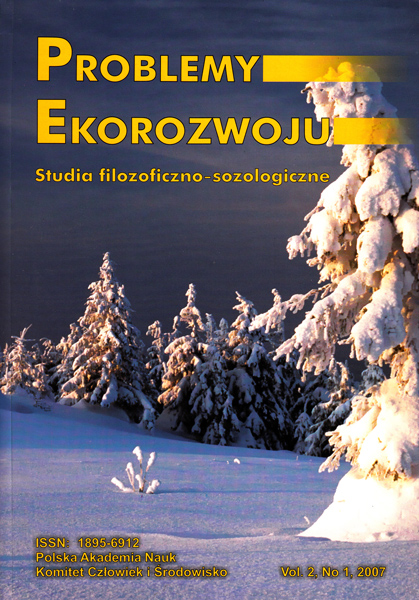Editorial
Main Article Content
Authors
Abstract
The sustainable development concept rapidly assumed great popularity, only to gain a firmer grounding during the famous Rio ”Earth Summit” of 1992. Among the documents adopted at that time, the one with a particular role in this respect was ”Agenda 21”, which represented a model action programme by which to achieve sustainable development at the global, regional and purely local levels. A key moment for the sustainable development concept in turn comes with an answer to a question concerning the source of the suggested obligation of present generations towards those that are to come. Paradoxical answers do not appear very often, probably because successive development strategies are written mainly by ecologists and economists. Care for the fate of future generations is something deeply rooted in traditional societies in which the model of the multi-generation family works most effectively. Also nothing strange to these societies is the idea of foresight as regards ”the needs of future generations”, extending across three generations to children, grandchildren and great grandchildren. Where everything to be based around such an attitude it would be easy to develop an ethic regarding the need for restraint today in the name of the wellbeing of future generations. Unfortunately, however, the cultural changes ongoing in today’s world are heading us in the opposite direction. In developed societies in particular, activity in the name of individual (also egotistical) needs is elevated to the rank of a virtue. Such an attitude may prove a significant obstacle to any implementation of a sustainable development concept that does, after all, speak of satisfying future generations’ needs. I am convinced that the sustainable development concept – and notably its European variant putting so much emphasis on the unity of socioeconomic conditioning and the natural environment – may serve as a basis for the rethinking of desirable directions where the development of contemporary civilisation is concerned. It would seem permissible to regard effective implementation of the sustainable development concept as dependent on human creativity first and foremost. That anthropopressure grows with the human population is undeniable, but creative potential also grows in parallel with it, making it possible for us to resolve the problems making themselves felt currently, and those that are going to emerge. The threats that have appeared to date have indeed proved amenable to limitation or even elimination by humankind, to the extent that I am compelled to cast doubt upon the claim that the impact of human population growth on the global ecosystem is a purely negative one.
However, that does not negate the value of today seeking new routes to the economical use of the Earth’s resources, including via such a development of our culture as will leave being, or existing, as the most important indicator of quality of life, as the Pope John Paul II stressed so often in his homilies. Problemy Ekorozwoju (Problems of Ecodevelopment) represents an open forum in which every effort is made to confer detail upon the subject matter outlined above, in terms of both the domestic Polish and international dimensions. Where the latter are concerned, a particular challenge is posed by the growing gap between rich and poor countries, and more generally between North and South. The disparities involved are so much more significant that even the wealthiest are now feeling a certain discomfort with them. In the social dimension, questions of aggression, threat or terrorism relate to each one of us, irrespective of the social and material status we have attained. And they are – it would seem – brought about by disequilibria in the socioeconomic relations of today’s world. A still greater problem relates to the non-sustainable management of the Earth’s resources. Our present state of knowledge allows us to assume that – unless some breakthrough that we are as yet unable to foresee takes place – there will be a major crisis over access to certain resources within the course of just one further generation. Appropriate management of the Earth’s resources would thus seem a matter of fundamental importance to the persistence of human civilisation, since that civilisation operates in connection with the extraction from the environment of raw materials that undergo either complete consumption or dispersal in the course of their utilisation. According to data cited in the October 2006 Environmental Science & Technology, the last few years have brought a dramatic rise in output of steel and alluminium to unprecedentedly high levels. This means a further massive increase in the exploitation of natural resources. In consequence, the concentration of carbon dioxide in the atmosphere increased over the previous year’s level by a further 0.6%. This is the greatest annual rise ever noted, notwithstanding the existence of a binding instrument of international law requiring abatement (i.e. the 1992 United Nations (Rio) Convention on Climate Change and the Kyoto Protocol to it). Data published by the European Environment Agency show that even the EU – the world leader when it comes to reducing emissions of greenhouse gases (mainly carbon dioxide) – has itself got problems with meeting the assumed reduction target. In accordance with the Kyoto Protocol, the emission of CO2 this year should be 8% below that in the base year 1990, while in fact the overall production by EU member states is only down by 0.9%. This result tells us that the world is far from achieving sustainability, making it essential that new solutions favoring sustainable development be sought, via both theoretical and practical means. I hope that our journal will make its own contribution to this development of what is an idea of such great importance to the future of our human civilisation.



